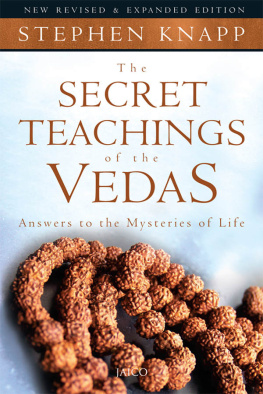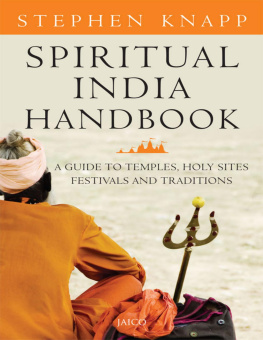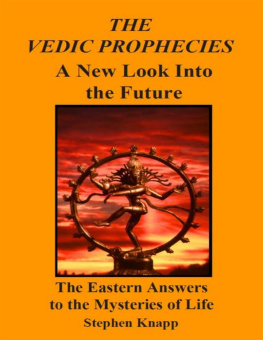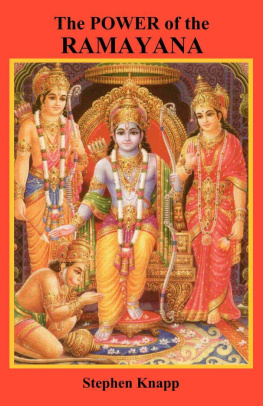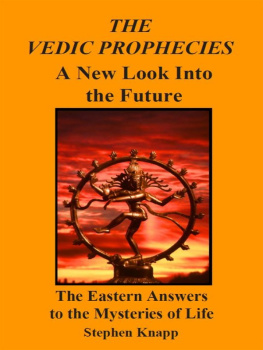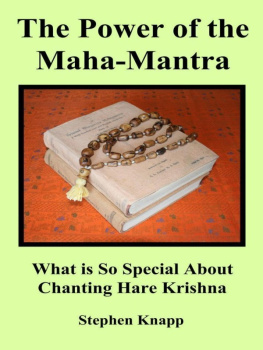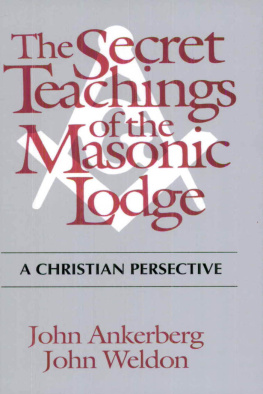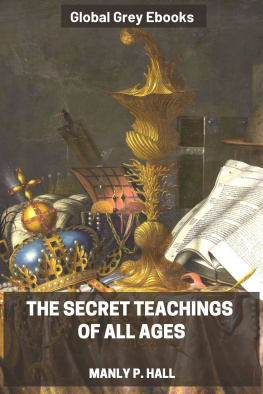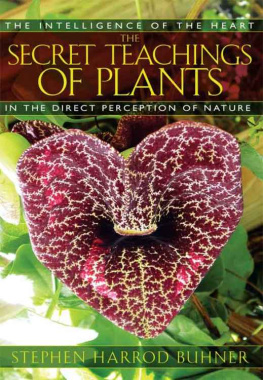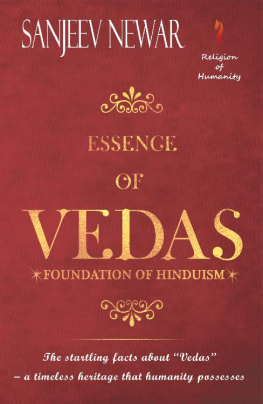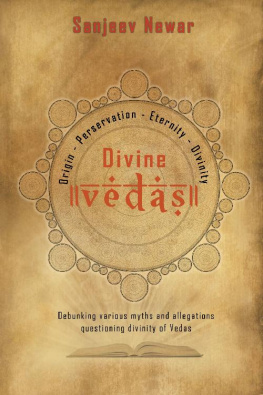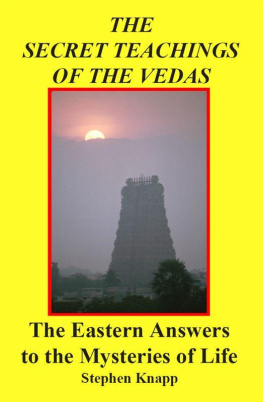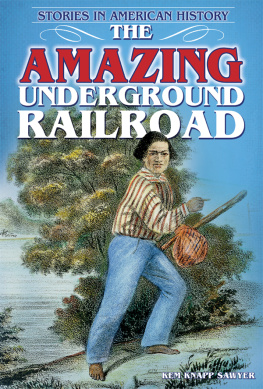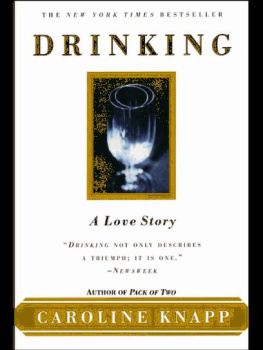Stephen Knapp - The Secret Teachings of The Vedas
Here you can read online Stephen Knapp - The Secret Teachings of The Vedas full text of the book (entire story) in english for free. Download pdf and epub, get meaning, cover and reviews about this ebook. year: 2012, publisher: Jaico Books, genre: Religion. Description of the work, (preface) as well as reviews are available. Best literature library LitArk.com created for fans of good reading and offers a wide selection of genres:
Romance novel
Science fiction
Adventure
Detective
Science
History
Home and family
Prose
Art
Politics
Computer
Non-fiction
Religion
Business
Children
Humor
Choose a favorite category and find really read worthwhile books. Enjoy immersion in the world of imagination, feel the emotions of the characters or learn something new for yourself, make an fascinating discovery.
- Book:The Secret Teachings of The Vedas
- Author:
- Publisher:Jaico Books
- Genre:
- Year:2012
- Rating:5 / 5
- Favourites:Add to favourites
- Your mark:
- 100
- 1
- 2
- 3
- 4
- 5
The Secret Teachings of The Vedas: summary, description and annotation
We offer to read an annotation, description, summary or preface (depends on what the author of the book "The Secret Teachings of The Vedas" wrote himself). If you haven't found the necessary information about the book — write in the comments, we will try to find it.
The Secret Teachings of The Vedas — read online for free the complete book (whole text) full work
Below is the text of the book, divided by pages. System saving the place of the last page read, allows you to conveniently read the book "The Secret Teachings of The Vedas" online for free, without having to search again every time where you left off. Put a bookmark, and you can go to the page where you finished reading at any time.
Font size:
Interval:
Bookmark:


Published by Jaico Publishing House
A-2 Jash Chambers, 7-A Sir Phirozshah Mehta Road
Fort, Mumbai - 400 001
www.jaicobooks.com
Stephen Knapp
Published in arrangement with
Stephen Knapp
P. O. Box 15082
Detroit, Michigan 48215 USA
www.stephen-knapp.com
http://stephenknapp.wordpress.com
THE SECRET TEACHINGS OF THE VEDAS
ISBN 81-7224-091-0
First Jaico Impression: 1993
Tenth Jaico Impression (Revised & Expanded Edition): 2010
Twelfth Jaico Impression: 2011
All rights reserved. No part of this book may be reproduced in
any form without written permission from the publisher,
except for brief quotations.
The many quotes from Bhagavad-gita As It Is,
Srimad-Bhagavatam, Sri Caitanya-caritamrita, and Brahma-samhita,
are used with permission from the
Bhaktivedanta Book Trust International. Copyright 1972.
DEDICATED TO
All those who ever gave me any encouragement
on the path to spiritual understanding
CONTENTS
CHAPTER ONE
Finding the answers * Guidance from the Vedas
CHAPTER TWO
The Influence the Vedas have had on the West * Rediscovering Vedic science
CHAPTER THREE
The Compiling of the Vedas * Rig Veda * Yajur Veda * Sama Veda * Atharva Veda * The Puranas * Srila Vyasadeva Was Still Dissatisfied
CHAPTER FOUR
Finding ourselves * Review of Western philosophies * Problems with scientific theories of consciousness * Vedic recognition of the souls presence * The soul is eternal * The Vedic description of the soul * The nature of the soul * Supersoul: the unifying factor * Description of the Supersoul * Relationship between the soul and Supersoul * Being ignorant of the self * The cause of suffering * Achieving peace for the individual and for the world * Attaining the highest happiness
CHAPTER FIVE
Reincarnation in Christianity * Other references and believers in reincarnation * Approaching death * Rebirth * The law of karma and destiny * Free will and choice * Getting free of karma
CHAPTER FIVE (PART B)
Being truthful * Practicing austerity * Inner and outer cleanliness * The issue of abortion * Sex or no sex * Showing mercy and being vegetarian * Biblical quotations about meat-eating * The karma of the nation
CHAPTER SIX
What are the modes of nature * How the modes of nature work * Action and consciousness in various modes * Where the modes take us * Becoming free from the modes
CHAPTER SEVEN
The basic universal structure * Description of hell * Description of heaven * The opportunity in this earthly existence
CHAPTER EIGHT
Darwins theory * The Big Bang Theory * Our ignorance of life * The five basic stages of human evolution * Life in the womb and birth of the living entity * Life in the material world * Old age and death * The afterlife--heaven, hell, or beyond
CHAPTER NINE
Why the material world exists * Why there is life at all
CHAPTER TEN
God is personal and impersonal * The Absolute Truth is a person * Descriptions from the Brahma-samhita
CHAPTER ELEVEN
The universal form
CHAPTER TWELVE
Foreword
The present work is the first volume of an extensive project of four volumes on The Eastern Answers to the Mysteries of Life contemplated by Stephen Knapp in order to provide an exhaustive understanding of the various aspects of human spirituality and spiritual evolution. This volume is titled The Secret Teachings of the Vedas. It focuses specifically on the Vedic and post-Vedic philosophical and religious responses to the persistent curiosities and inevitable queries of the human mind in its encounter with the spatiotemporal immensity of the universe, about its whence and whither, and the place and purpose of the human person within it, for whose emergence and existence on the earth, the entire universe is but necessary.
Not only the primordial reality, the raison d'etre of the universe, but even the universe itself with its myriad inorganic and organic systems is a mysterium tremendum et fascicans, a mystery ever engaging and challenging the human intellect to unravel its notso-impenetrable visage. It opens up its deepest secrets to the probings of the scientific and religious minds, unless the same human mind through its deviant irrationality decides to precipitate a general catastrophe that spells destruction of all its erstwhile achievements.
The author authentically and ably presents the ancient Indian thoughts and insights in dealing with numerous questions regarding life and its origins, the whys of life and the material world surrounding it, the soul and its passage through various life-forms and through various human planes to its ultimate destiny, the nature of God, our spiritual identity, the law of karma and reincarnation, the modes of Prakriti and the consequent character of actions, karmic disposition and free will that determine the quality of future existence, the nature of good and bad karmas, vegetarianism, the structure of the universe, including heaven and hell, and the description of Vaikuntha or the spiritual world. The discussion of the brain-mind-consciousness question (pp 39-45) is of special interest.
The book is a labor of love and an act of devotional service. It is a genuine expression of what Stephen Knapp has thought through in his spiritual journey and the conviction he has found in the course of his personal life-experiences. That is the reason why the book is written with such simplicity, lucidity, and accuracy. It is enlivened by examples from practical life to bring home spiritual ideas. The main basis of exposition of these ideas is the Bhagavat Purana which the author copiously cites.
The book is not only a discussion of the issues concerning the mystery of existence and of human life in terms of Indian teachings of the Vedic literature, but also a conscious effort to relate those insights to the contemporary age and its ethos.
In conclusion, Stephen Knapp advocates that the Vedic teachings offer us guidance through the maze of modern maladies brought about by the complex industrial and technological civilization, and make human life worthwhile.
The book is a welcome introduction to the teachings of the Vedic and Puranic literature on the various topics of metaphysical and spiritual interest.
Prof. Mahesh Mehta
Department of Religious Studies
University of Windsor
Windsor, Ontario, Canada
Preface
There are many books being written these days on spiritual or occult subjects by authors who present their ideas and teachings as if they were facts, but do not provide any traditional references or scriptural evidence to justify what they write. This book, The Secret Teachings of the Vedas: The Eastern Answers to the Mysteries of Life, is written to establish an alternative to the highly speculatory, inconclusive, and often times problematic theories about the universe, the soul, life after death, where we have come from, where we are going, and the various ideas about the Absolute that are presently being spread and accepted today.
The truths that are contained in the ancient texts often hold the clearest understanding of life that can be found anywhere. This will become more apparent as we present various parts of the Vedic teachings to clarify many theories that an increasing number of people are starting to seriously consider. These include such concepts as the eternality of the soul, reincarnation, karma, destiny, who we are, the meaning of life, and all the questions that often go unanswered for lack of knowledge.
Next pageFont size:
Interval:
Bookmark:
Similar books «The Secret Teachings of The Vedas»
Look at similar books to The Secret Teachings of The Vedas. We have selected literature similar in name and meaning in the hope of providing readers with more options to find new, interesting, not yet read works.
Discussion, reviews of the book The Secret Teachings of The Vedas and just readers' own opinions. Leave your comments, write what you think about the work, its meaning or the main characters. Specify what exactly you liked and what you didn't like, and why you think so.

